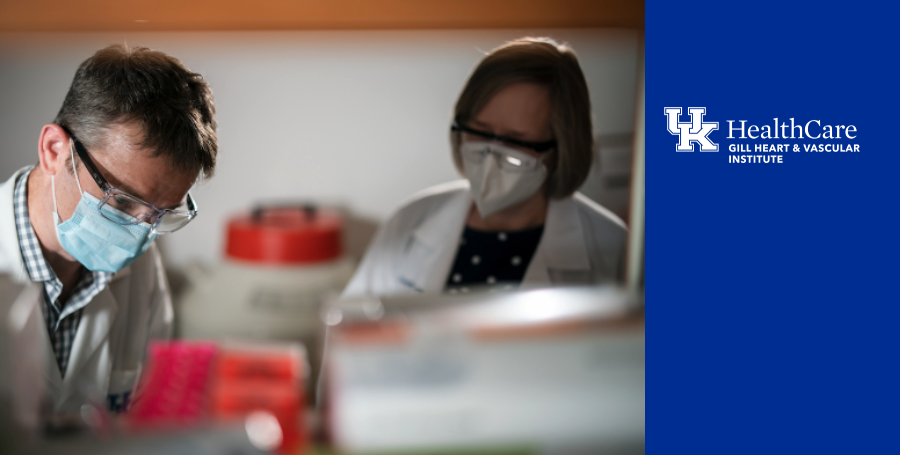MYRA: an alliance finding innovative approaches for improved cardiac recovery

The Myocardial Recovery Alliance (MYRA) is a team of highly qualified cardiovascular experts and scientists across campus leading revolutionary studies that could change standards of cardiac care in real time.
For many years, ventricular assist devices (VADs) were considered a last resort for patients with serious heart failure. These mechanical pumps, which help maintain blood circulation, were mainly used for patients awaiting a heart transplant.
Recent studies conducted by University of Kentucky researchers suggest VADs actually could be used to recover the hearts of patients with heart failure, even those with advanced heart failure, possibly preventing their need for transplants in the future.
Holding this research at UK could be groundbreaking for the state of Kentucky. UK HealthCare performs more than 40 heart transplants per year, or one percent of heart transplants worldwide.
Emma Birks, MD, PhD, and Ken Campbell, PhD, are co-principal investigators of the Myocardial Recovery Alliance (MYRA), a team established under the UK College of Medicine’s Alliance Research Initiative. Together, with a team of highly qualified cardiovascular experts and scientists across campus, they’re leading revolutionary studies that could change standards of cardiac care in real time.
Cardiovascular disease is one of the Research Priority Areas from the UK Office of the Vice President for Research.
“In the early days, no one really wanted to be involved with VADs because the outcomes weren’t good,” Dr. Birks said. “But we found that by changing the parameters on the pump, we can get patients to feel better. When you take a very sick young person and you get them to survive and live with the pump, then go home and have a good quality of life and then ultimately return the heart function to normal, it’s really very rewarding.”
Dr. Birks and Dr. Campbell bring international experience to Kentucky, having come from “one U.K. to another.”
Dr. Birks is from England, where she earned her training and became a global leader in myocardial recovery and the study of VADs. She has led numerous clinical trials and long studied molecular mechanisms impacting heart failure and recovery. She recently joined the University of Kentucky as section chief of advanced heart failure, mechanical circulatory support, and heart transplantation after nearly a decade at the University of Louisville.
Dr. Campbell, originally from Scotland, is a professor of physiology with expertise in cardiac contractility and mathematical modeling of cell and molecular-level contractile function. He joined the University of Kentucky in 1998 and now directs the Center for Clinical and Translational Science (CCTS) Biospecimens Core.
The collaborative structure of the Alliance Research Initiative has played a major role in bridging the connections between researchers and cardiologists, which is not a simple task but one that can make a huge difference in accelerating the research process. Due to the nature of the profession, clinicians invest much of their time in practice. In the MYRA Alliance Dr. Birks and other cardiologists are invested in research, too.
“Before joining MYRA, I might not have been able to connect so easily with specialists involved in clinical care, but now I have nearly 15 cardiologists in my phone contacts who I can reach out to, and sometimes get responses in 30 seconds,” Dr. Campbell said. “These connections aren’t unheard of, but rare, and they are really crucial in making our research more efficient.”
Meanwhile, the team benefits greatly from Dr. Campbell’s leadership of the CCTS Biospecimens Core and the Gill Cardiovascular Biorepository. These biobanks provide researchers and clinicians within MYRA samples of myocardium donated by patients for research.
Collaborations across departments and colleges have allowed the MYRA team to make strides in research and clinical developments. The team already has developed computer models of hearts that evolve in response to pharmaceutical and genetic manipulation at the molecular level. Clinicians and scientists will use knowledge gained from these models to improve patient care and treatment.
With the right connections to experts and resources, MYRA is poised to lead clinicians and researchers in Kentucky and beyond to better understand myocardial recovery while allowing patients with serious heart failure to live longer, healthier lives.
To learn more about MYRA and our other Alliance teams, click here: https://medicine.uky.edu/sites/research/myra
MYRA Alliance Team Members:
- Ahmed Abdel-Latif, MD, PhD, Associate Professor – Department of Internal Medicine
- Emma Birks, MD, PhD, Professor – Department of Internal Medicine
- Ken Campbell, PhD, Professor – Department of Physiology
- Mark Ebbert, PhD, Assistant Professor – Sanders-Brown Center on Aging
- Vedant Gupta, MD, Assistant Professor – Department of Internal Medicine
- Candice Harvey Falls, PhD, Associate Professor – College of Nursing
- Andrew Kolodziej, MD, Assistant Professor – Department of Internal Medicine
- Sarah Kosta, PhD, Mentored Scientist – Department of Physiology
- John Kotter, MD, Associate Professor – Department of Internal Medicine
- Steve Leung, MD, Associate Professor – Department of Internal Medicine
- Bryana Levitan, RDCS, Cardiac Sonographer – Gill Heart and Vascular Institute
- Greg Milburn, Mentored Scientist, MD/PhD Student – Department of Physiology
- Vince Sorrell, MD, Professor – Department of Internal Medicine
- William Stoops, PhD, Professor – Department of Behavioral Science
- Jonathan Wenk, PhD, Associate Professor – College of Engineering




